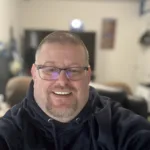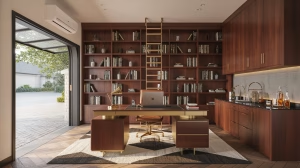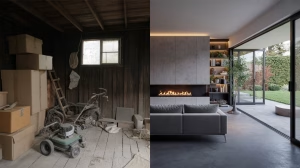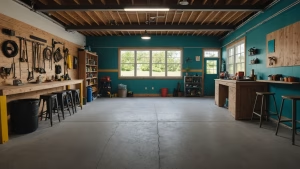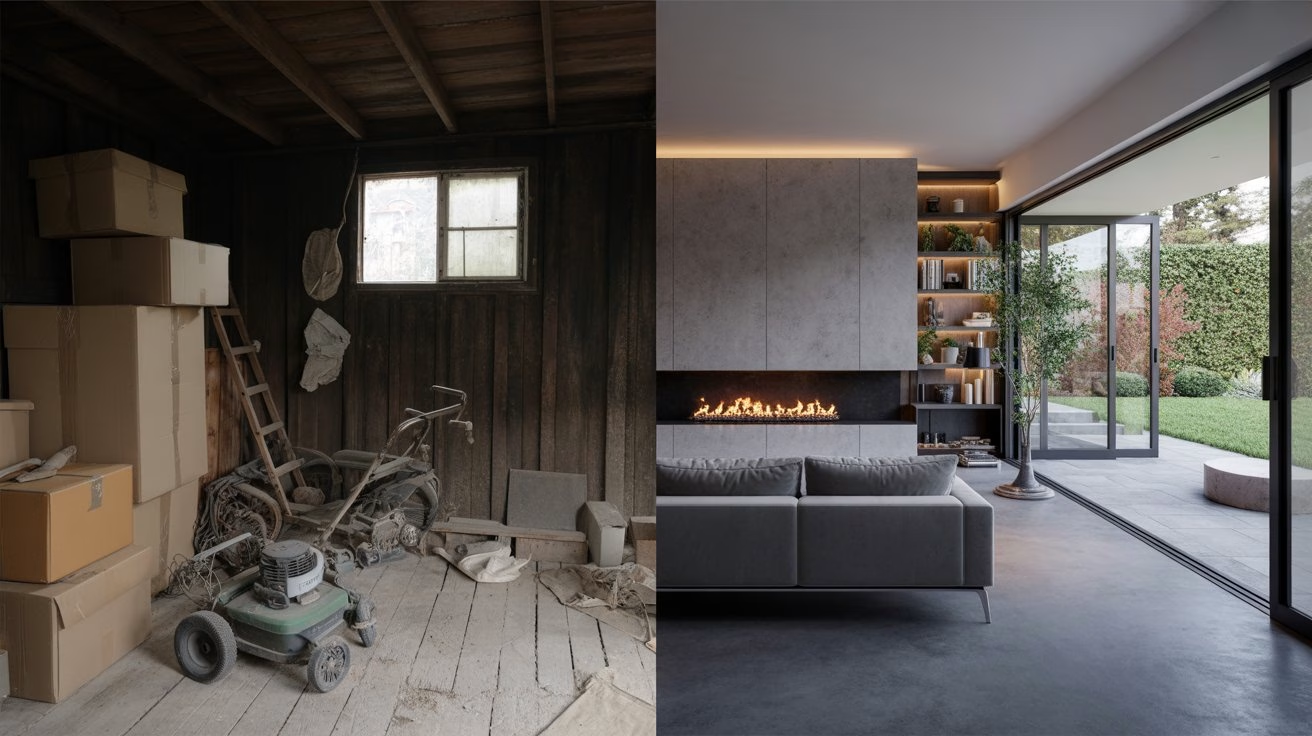Planning to add a 2 car garage? Understanding the garage construction cost is key to avoiding surprises. This guide breaks down how much does it cost to build a 2 car garage, covering materials, location, and design choices.
Factors like regional labor rates and building codes affect the 2 car garage cost estimate. Whether you’re expanding storage or boosting home value, this article provides clear steps to estimate costs and stay within budget.
Understanding the Basics of a 2 Car Garage
A two-car garage typically measures between 20 to 24 feet wide and 20 to 24 feet deep. This space accommodates two vehicles with room for storage shelves or work areas. Standard designs include concrete foundations, insulated walls, and roofs built to local building codes. Overhead doors, electrical outlets, and ventilation systems are essential features included in most garage construction cost estimates.
Proper planning reduces unexpected expenses during construction. Knowing standard specifications ensures you compare accurate average cost of building a garage quotes. For example, a basic structure with minimal upgrades might start around $8,000, while premium materials can double this figure. Dimensions and layout choices directly influence final costs.
Local zoning laws and permit requirements also shape the building process. Compliance ensures your design meets safety standards without requiring costly redesigns. Starting with clear functional goals helps align your vision with realistic garage construction cost expectations. Researching material options early simplifies budget allocation and avoids mid-project adjustments.
Factors Affecting Garage Construction Costs
Geographic location heavily influences garage building expenses. Urban areas often face higher pricing for 2 car garage construction due to elevated permit fees, labor rates, and material transport costs. Rural sites may reduce land costs but might add delivery expenses for materials.
Site preparation varies based on terrain. Flat lots need minimal grading, while sloped land requires retaining walls or excavation, adding labor and material costs. Soil stability tests and drainage solutions also impact budgets.
Material choices create significant cost differences. Vinyl siding costs less than brick, while asphalt shingles are cheaper than architectural metal roofing. High-end finishes like stone veneers or custom doors escalate garage building expenses.
Labor costs shift regionally. Metropolitan builders may charge 20–30% more than rural contractors. Seasonal demand peaks can raise pricing, while off-peak scheduling might offer discounts. Unexpected issues like underground utilities discovery add unplanned expenses.
Average Costs for Building a 2 Car Garage
The average cost of building a garage varies based on design and location. A standard 400–576 square foot detached garage costs between $19,600 and $28,200. Attached garages, which connect to a home, often range from $26,000 to $42,000 due to structural integration. These totals include materials and labor for foundation work, framing, and finishing touches.
Cost breakdowns show foundation work takes 15–20% of the budget. Framing and roofing account for 15–25% and 10–15%, respectively. Doors and windows make up another 10–15%, while siding, electrical, and interior work add 5–15% more. Budgeting for each category helps prioritize expenses.
Regional differences impact the build 2 car garage price. Northeast and West Coast projects may cost 15–25% more than national averages. Southern and Midwestern states often see savings of 10–15% due to lower labor and material costs. These variations depend on local market conditions and supply chains.
Understanding these figures provides a starting point for budget planning. Homeowners can adjust selections in higher-cost areas like siding or electrical to stay within financial goals. Comparing local contractor quotes alongside these averages ensures realistic expectations for the project.
Budgeting for Your Garage Project
Creating a realistic budget starts with your base garage construction cost. Begin by adding line items for permits, electrical wiring, and insulation. Unexpected expenses often arise, so allocate 15-20% of your total budget as a contingency. This covers surprises like soil testing or plumbing adjustments.
Scheduling matters. Contractors in off-peak seasons like late fall may offer lower labor rates. Compare quotes from multiple builders to avoid overpaying. Online calculators and contractor estimates help track costs of adding a garage to a home accurately. Prioritize essential features first to stay within budget.

Interior finishes and exterior materials impact final costs. Opt for standard door styles or energy-efficient windows to save without sacrificing quality. Regularly update your budget spreadsheet to reflect changing material prices or design choices. Avoid cutting corners on drainage systems or foundation work, as these affect long-term durability.
Research local zoning rules early to avoid fines. Factor in utility hookups and landscaping in your cost of adding a garage to a home. Tracking every expense ensures you stay prepared for both expected and unexpected costs throughout the project.
DIY vs. Hiring a Professional
Choosing between DIY construction and hiring a contractor impacts both the build 2 car garage price and project timeline. A self-built 2-car garage may save $8,000 to $15,000 compared to hiring pros, but requires 4-8 weeks of dedicated work. Homeowners must assess their skills: framing and siding are often manageable for DIYers with tools, while foundation work or electrical systems demand licensed expertise.
Professional contractors offer guarantees on 2 car garage cost estimate accuracy and safety compliance. General contractors charge 10-20% more than specialty garage builders due to broader service scopes. Fixed-price contracts lock in costs upfront, while cost-plus agreements let homeowners track expenses in real time. Electrical and plumbing systems alone can add $3,000-$6,000 if done incorrectly, making professional oversight critical for code compliance.
Self-builders save labor costs but risk hidden expenses from material miscalculations. Roofing mistakes, for example, may cost $2,500 to correct. Contractors handle permit applications and inspections, saving time but increasing total expenditures. Compare your available hours, skill level, and tolerance for risk to decide the best approach for your build 2 car garage price goals.
Permitting and Regulations
Permits are a critical part of garage building expenses. Costs vary widely: permits for a 2-car garage might start at $200 in rural areas but reach $2,000+ in cities with strict zoning. These fees cover compliance checks and safety inspections. Before construction, research local requirements to avoid unexpected delays.
Local codes dictate setbacks—typically 5 to 20 feet from property lines—and height limits, often capped at 15–20 feet. Utility connections may also require permits. Failing to meet these can lead to fines or forced redesigns, adding to total costs.
Homeowners’ associations (HOAs) often enforce design rules like color, materials, and rooflines. These approvals can add time and expense to the project. Ignoring HOA guidelines might delay or void your building plans entirely.
Budgeting for permits and compliance ensures smooth construction. Factor in permit fees, inspection costs, and design adjustments early. This planning helps estimate how much does it cost to build a 2 car garage accurately, avoiding hidden fees that inflate budgets.
Additional Features That Impact Cost
Customizing a 2-car garage often involves adding features that increase the pricing for 2 car garage construction. Homeowners must weigh upgrades against their needs. Basic insulation costs $1,000–$2,500, improving energy efficiency. Climate control systems like heating or cooling add $2,000–$5,000 depending on the system chosen.
Electrical upgrades play a key role. Basic lighting and outlets cost $1,000–$1,500. Upgrading to 220V service for tools or EV charging adds $2,000–$3,500. This choice impacts long-term garage building expenses.
Plumbing options vary widely. A utility sink costs $800–$1,200. Adding a full bathroom increases garage building expenses by $5,000–$10,000. This depends on plumbing requirements.
Garage doors significantly affect costs. Standard non-insulated doors start at $750 each. Premium insulated doors with modern openers can exceed $2,500 each. These choices directly influence total pricing for 2 car garage construction.
Windows also matter. Each standard window adds $300–$700. More windows boost both aesthetics and costs. Quality and quantity shape final expenses.
Understanding these features helps prioritize upgrades. Balancing desired amenities with garage building expenses ensures a practical budget. Each choice reflects personal needs and long-term benefits.
Maintenance Costs After Construction
Understanding the total lifecycle cost requires considering both the average cost of building a garage and ongoing upkeep. Regular maintenance ensures longevity while keeping expenses manageable. Exterior upkeep includes repainting or re-siding every 7–10 years, costing $1,500–$3,000. Roof repairs or replacements every 15–30 years may add $2,000–$5,000, while annual gutter cleaning ranges from $100–$200.

Interior maintenance focuses on floors, doors, and weatherproofing. Sealing concrete floors every 2–3 years costs $200–$500. Garage door servicing annually runs $100–$200, and weather stripping replacement every 3–5 years costs $50–$150. Preventative steps like proper drainage and insulation reduce moisture damage and extend material lifespan.
Quality materials during construction lower long-term expenses. Warranties covering materials and labor for 5–10 years can offset some costs. Budgeting for these expenses ensures the cost of adding a garage to a home remains affordable over time. Prioritizing maintenance keeps costs predictable and avoids costly repairs.
Factoring in these expenses helps homeowners plan for the garage’s full lifecycle. Regular upkeep complements the initial investment, maintaining value and functionality. Smart planning transforms maintenance into a manageable part of the average cost of building a garage equation.
Financing Your Garage Construction
Securing funds for a 2 car garage cost estimate starts with exploring financing options. Home equity loans and lines of credit (HELOCs) often provide competitive rates, typically 1-2% above the prime rate. These loans use home equity as collateral and offer terms from 5 to 15 years.
Construction loans are another choice, though they may have higher initial rates. These loans convert to permanent financing once the project is complete. Personal loans offer quick approval but carry higher interest rates, usually between 6-12% for qualified borrowers. Contractor-offered financing plans may add fees that increase overall costs.
A $30,000 garage project financed at 5% interest over 10 years would total about $38,000 when including interest. This example highlights how financing choices affect the final how much does it cost to build a 2 car garage. Homeowners should compare loan terms to balance monthly payments and long-term expenses.
Tax considerations also matter. Property taxes may rise after construction, while energy-efficient features might qualify for tax credits. Review loan terms alongside local tax policies to avoid surprises. Comparing loan options ensures the project stays within budget and aligns with long-term financial goals.
Final Thoughts on Building Your 2 Car Garage
Building a 2-car garage requires careful consideration of the build 2 car garage price and cost of adding a garage to a home. Location, materials, and labor choices all shape the final expense. Prioritizing structural integrity over luxury upgrades ensures long-term durability. Researching local building codes and contractor estimates is critical to stay within budget. A well-planned garage can add 60–80% of its cost to your home’s value, making it a worthwhile investment. Start by defining essential needs: storage, workspace, or both. Allocate a contingency fund of 10–15% to handle unexpected costs. Focus on energy-efficient materials and professional permits to maximize resale appeal. Over time, this project enhances daily convenience while preserving financial and functional value. Thoughtful planning turns this investment into a practical asset for years to come.


